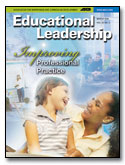September 2006
Teaching to Student Strengths
Recent research on cognition throws new light on learning differences. How can teachers encourage students to see their own potential? How do teachers go about discovering student assets? What roles do the theories of differentiated instruction and multiple intelligences play in addressing the strengths of students from diverse cultures and of those with special needs? What kinds of assessments reveal abilities that may not emerge through traditional tests?
A Special Section on Gender Differences will explore ways in which schools are closing the “gender gaps” for both boys and girls.
Deadline: April 3, 2006
October 2006
Reading, Writing, Thinking
An overconcentration on teaching the technical basics of reading and writing threatens to monopolize literacy instruction in some schools. How can we connect reading, writing, and thinking to foster deeper and more meaningful learning? How can we make sure that in our efforts to teach decoding and writing formats, we don't shortchange higher-order thinking skills? This issue will address how students can improve literacy through strategic thinking, learn to read and write expository text, and master the art of reading and writing in the content areas. Among topics we will be looking for: fostering literacy and critical thinking; promoting early literacy; preparing students for tests without sacrificing meaning; and making reading and writing meaningful to students.
Deadline: May 1, 2006
November 2006
NCLB—Taking Stock, Looking Forward
This issue will look at how NCLB regulations have changed U.S. education. Are students growing in proficiency in reading and math? Are schools making adequate yearly progress? How have the regulations affected principals, teachers, parents, and, especially, students? What have been the effects of requiring highly qualified teachers? Allowing families to choose other schools when local schools fail? Requiring schools to provide tutoring for struggling students? Are schools deepening or limiting curriculum? Is the strong emphasis on testing improving learning? What changes would improve NCLB? Will NCLB—and NCLB-like regulations—give us the graduates we need? We welcome international contributions from authors in all countries responding to centralized reform mandates.
Deadline: June 1, 2006
December 2006/January 2007
Science in the Spotlight
From new mandates to teach intelligent design to calls for more rigorous testing, interest in science education is intensifying. This issue will explore the controversies surrounding the teaching of science as well as how to effectively teach it. We'll be looking for articles that describe innovative ways in which schools and districts are making science accessible to more students. How can we train and recruit effective science teachers? How are teachers incorporating technology into science? Integrating the sciences? Teaching the new sciences, from bioethics to genetics? Making the sciences relevant to students' lives? Teaching students how to read scientific texts? Which teaching and assessment practices are most suited to educating both informed citizens and future scientists?
Deadline: July 3, 2006
February 2007
Improving Instruction for Students with Learning Needs
What are schools doing to meet higher expectations for the achievement of students with learning challenges? Whereas the emphasis was formerly on meeting individualized learning goals, today, students in special education are included in the accountability provisions that their schools must meet. Which instructional and testing strategies are effective for students with learning disabilities? Which programs best prepare both special and general education teachers? Which staffing structures help these professionals collaborate to improve learning, and how can teachers without training in special education teach in ways that authentically include students with learning challenges? Are schools over-identifying some groups of students as being in need of special education? What are schools doing to avoid such mistakes?
Deadline: September 1, 2006
March 2007
Responding to Changing Demographics
When student demographics—size of student population, language, culture, family income patterns—change, how do schools effectively respond? This issue will describe strategies and programs that help schools meet change positively. How are schools adjusting curriculum and reinventing family-school connections? How are teachers providing quality instruction for students with a plethora of languages and cultural patterns? What do schools do when cultural expectations between students and teachers clash? How are educators facilitating conversations about tough subjects—religion, race, culture, class? What changes in school schedules, design, and structures bring disparate groups together and enhance the gifts of diversity?
Deadline: October 2, 2006
April 2007
The Prepared Graduate
How can schools prepare students to be productive workers, active citizens, involved family members, and good neighbors? This issue will look at the skills, knowledge, and qualities that students will need to be ready for life after high school. Topics will include how schools are preparing students for satisfying careers in a world that requires skills in advanced technology, problem solving, and teamwork; the demands of higher education and approaches that enable students to succeed in college and beyond; school programs that help students develop good character; and practices that make students aware of their responsibilities as citizens of their nation and world.
Deadline: November 1, 2006
May 2007
Curriculum for the Whole Child
Deepening ASCD's commitment to the well-being of children, this theme issue will look at how schools are addressing students' physical, emotional, social, moral, and intellectual development through curriculum and instruction. In light of today's emphasis on testing, how are schools ensuring a balanced curriculum? How are schools providing recess, arts instruction, and field trips despite funding constraints? How are teachers making sure students are challenged intellectually? How are they engaging the disengaged and encouraging students to become lifelong learners and well-balanced human beings?
Deadline: December 1, 2006
